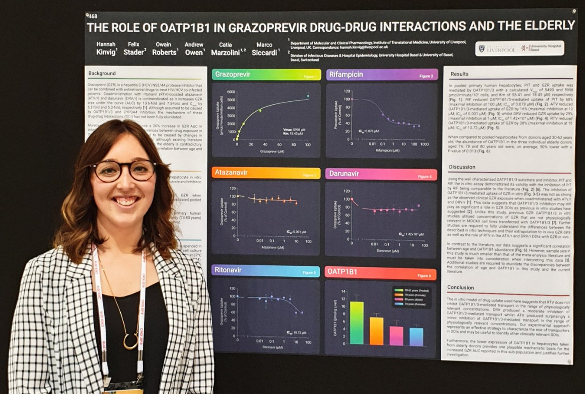
Hannah Kinvig is a 4th Year PhD student at the University’s Institute of Systems, Molecular and Integrative Biology. Her PhD is funded by the University Hospital Basel and her supervisors include Dr Marco Siccardi, Professor Catia Marzolini and Professor Andrew Owen.
HIV and drug-drug interactions
Human immunodeficiency virus (HIV) is a major public health issue with UNAIDS reporting that worldwide in 2019 38 million people were living with HIV, 1.7 million people were newly infected, and 690,000 people died from AIDS-related illnesses. The pharmacological and clinical management of HIV therapy can be complex due to comorbidities and people living with HIV (PLWH) often use multiple medications, which leads to an increased risk of drug-drug interactions (DDIs).
DDIs can be defined as the administration of two or more drugs which adversely interact with one another to alter their effectiveness or toxicity. Several recent studies assessing the prevalence of DDIs in PLWH across multiple countries demonstrated that 19-33% of study participants had at least one potential DDI. Antiretroviral (ARV) drugs used for the treatment and prevention of HIV have been identified as both victims and perpetrators of DDIs. However, it is neither practical nor sustainable to evaluate all ARV DDIs in clinical studies and so other methods of investigation are required.
My research
The aim of my PhD was to utilise in vitro and in silico techniques to predict the magnitude of ARV DDIs and understand how they occur to provide guidance for their clinical management. Much of my thesis was dedicated to the assessment of transporter-mediated ARV DDIs in the liver. The liver contains several clinically relevant drug transporters which mediate the uptake and excretion of a wide range of drugs, however, there remains a lack of understanding of the underlying mechanisms of these transporter-mediated DDIs. At the Conference on Retroviruses and Opportunistic Infections (CROI) in 2019 I presented my in vitro assessment of the mechanistic action of the DDI between the hepatitis C (HCV) NS3/4A protease inhibitor grazoprevir, and the ARV protease inhibitors atazanavir, darunavir and ritonavir.
The impact of age on transporter-mediated DDIs is unclear and with the life expectancy of PLWH now reaching that of the general population, it is critical that we expand our knowledge to support the management of DDIs in elderly adults living with HIV. This year at the International Workshop on Clinical Pharmacology of HIV, Hepatitis, and Other Antiviral Drugs I presented my in vitro comparison of the expression of the hepatic uptake drug transporter OATP1B1 and magnitude of OATP1B1-mediated DDI in non-elderly and elderly adults.
I used the data produced from the in vitro techniques above to develop physiologically-based pharmacokinetic (PBPK) models to determine the clinical outcome of the transporter-mediated DDIs. In brief, PBPK models are a mathematical framework that describe the human body in order to simulate the absorption, distribution, metabolism and excretion (ADME) of a drug in a cohort of virtual patients. These models can be applied to predict the effect of different dosing regimens, DDIs and even novel routes of administration. In addition to transporter-mediated DDIs, my thesis also assessed the enzyme-mediated DDI between the ARV dolutegravir and antibiotic rifampicin co-administered for the treatment of leprosy in PLWH. This work was presented earlier this year at the Conference on Retroviruses and Opportunistic Infections (CROI) and demonstrated the ability of PBPK modelling to inform the development of effective dosing strategies.
What I’m working on
Alongside writing my thesis, this year I have been working as a Research Assistant with Dr Marco Siccardi. Together with Queen’s University Belfast we are investigating nano-engineered microarray patches (MAPs) for the enhanced delivery of long-acting antiretroviral drugs. Dr Siccardi and I are developing PBPK models to predict the pharmacokinetics of MAPs and aid in their design and laboratory assessment. This project aims to provide an alternative drug-delivery system to improve drug adherence in the treatment and prevention of HIV, which remains a key issue in this community.
Life as a PhD student
Working amongst a diverse group of people from around the world with varying scientific backgrounds is one of my favourite things about being a PhD student in Dr Siccardi’s group. Regularly discussing our projects and teaching one another different skills, collaborating on papers and going on monthly social outings to arcades, mini golf and board game cafes in Liverpool has supported me both physically and mentally throughout my PhD. Looking to the future, I hope to continue working with Dr Siccardi’s group on PBPK modelling. Once I have completed my PhD here in Liverpool I will join my partner in the USA and am excited for the opportunities that my planned move will bring.